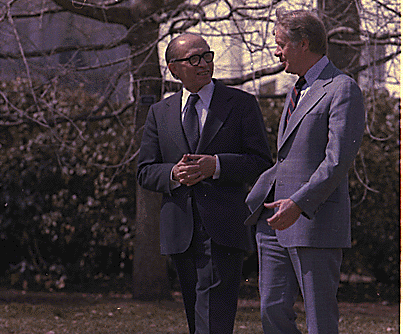After a year in office, the Carter administration’s initiative to achieve a comprehensive Middle East peace between Israel and her Arab neighbors stalls. Egyptian President Anwar Sadat’s unexpected visit to Jerusalem (November 1977) pushes the prospects of a bilateral Egyptian-Israeli agreement to the forefront. What had not changed in Carter’s foreign policy is a systematic effort to improve US relations with Arab states while simultaneously indicating that Israel’s special relationship with the United States is in decline. Carter makes overtures to the PLO, restricts Israel’s access to promised weapons, and votes at the UN against Israel’s use of force in response to a PLO terrorist attack. Israeli and American Jewish anger for the Carter administration continues to mount as the Egyptian-Saudi-Israeli arms deal is passed later in the spring.

